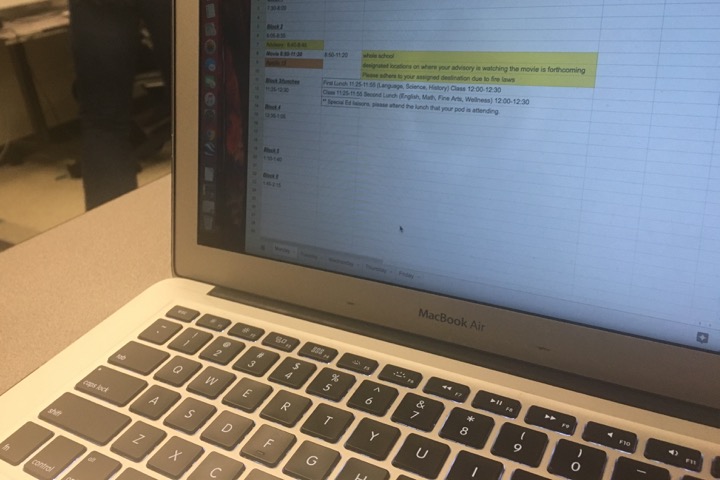WW ’17: WHS students watch “Apollo 13” film
Credit: Meg Trogolo
Above, a student looks at the Winter Week schedule. As part of Winter Week, all WHS students watched the film “Apollo 13.”
February 4, 2017
On Monday, WHS students watched the film “Apollo 13” as part of the school’s annual Winter Week. This was the second year that Winter Week has included a school-wide film screening, with last year’s choice being the 2014 film “Selma.”
“It’s a nice technology and science film, and maybe we don’t see a lot of stuff along those lines,” history department head Kevin Delaney said.
“Apollo 13” tells the story of NASA’s Apollo 13 mission to the moon in 1970, during which the spacecraft containing three astronauts malfunctioned, forcing NASA to improvise in order to bring them back to Earth safely.
Before Winter Week, student council president Curran Murphy said in an email to the student body that the film was “all about hope, exploration and the power of science.”
When the film was released in 1995, critics praised it for its scientific accuracy. Physics and astronomy teacher Ken Rideout agreed with the assessment although he said he was not familiar with the particular history of the mission.
“It’s pretty good by Hollywood standards. There’s nothing that made me flinch,” Rideout said. “If they misused [scientific terms], it would bother me, but I thought they did all right.”
Last winter, students viewed “Selma,” a film about the 1965 march for black voters’ rights from Selma to Montgomery, Alabama. Because showing last year’s film tied into Black History Month and “Apollo 13” does not, some members of the WHS community questioned the choice.
“I really liked how that worked out with “Selma.” It seemed to be a nice complement between Winter Week and Black History Month. There was a synergy there that was worth reproducing,” Delaney said.
Delaney also mentioned the recent film “Hidden Figures,” about three black female mathematicians and their contributions to the NASA space missions of the 1960s.
“[Apollo 13] probably doesn’t tell the whole story; what movie can? In [this movie’s] case, female black mathematicians aren’t featured,” Delaney said. “There are probably voices left out. That’s not the entire story.”
Rideout added that he was ambivalent about the choice to show the film as well, but expressed enjoyment.
“It seems a bit strange for me to do that during the school day,” Rideout said. “As an astronomy teacher and a science teacher, I think it’s a cool choice from my discipline’s perspective.”





![Last Wednesday, the Wayland School Committee gathered to discuss a number of topics regarding the health curriculum and Innovation Career Pathway course. Another large topic of conversation was the ways to potentially mitigate distracting cell phone usage. "These [phones] are going to distract your learning and social relationships," Superintendent David Fleishman said. "That's concrete right there."](https://waylandstudentpress.com/wp-content/uploads/2025/06/Screenshot-2025-06-04-at-9.49.31 PM-1200x886.png)



























![Troy Hoyt finishes the Boston Marathon, running for the Hoyt Foundation. T. Hoyt is the son of Hoyt Foundation CEO Russ Hoyt.
“[Running a marathon] might seem like a big thing, when it’s presented to you at first, but if you break it up and just keep telling yourself, “Yes, you can,” you can start chipping away at it. And before you know it, you’ll be running the whole 26 miles, and you won’t even think twice about it.” T. Hoyt said.](https://waylandstudentpress.com/wp-content/uploads/2025/04/C36E8761-1CBB-452E-9DF2-543EF7B1095E_1_105_c.jpeg)












































